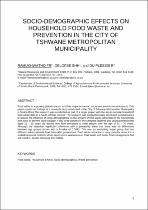 ResearchSpace
ResearchSpace
Socio-demographic effects on household waste and prevention in the City of Tshwane metropolitan municipality
JavaScript is disabled for your browser. Some features of this site may not work without it.
- ResearchSpace
- →
- Research Publications/Outputs
- →
- Conference Publications
- →
- View Item
| dc.contributor.author |
Ramukhwatho, Fhumulani R

|
|
| dc.contributor.author |
Oelofse, Suzanna HH

|
|
| dc.contributor.author |
Du Plessis, R

|
|
| dc.date.accessioned | 2018-11-28T13:00:59Z | |
| dc.date.available | 2018-11-28T13:00:59Z | |
| dc.date.issued | 2018-10 | |
| dc.identifier.citation | Ramukhwatho, F.R., Oelofse, S.H.H. and Du Plessis, R. 2018. Socio-demographic effects on household waste and prevention in the City of Tshwane metropolitan municipality. Wastecon 2018 Conference & Exhibition, 15-19 October 2018, Johannesburg, South Africa | en_US |
| dc.identifier.uri | http://www.wastecon.co.za/programme.html | |
| dc.identifier.uri | http://hdl.handle.net/10204/10548 | |
| dc.description | Paper presented at Wastecon 2018 Conference & Exhibition, 15-19 October 2018, Johannesburg, South Africa | en_US |
| dc.description.abstract | Food waste is a growing global concern as it has major economic, social and environmental impacts. This paper reports on findings of a research study conducted in the City of Tshwane Metropolitan Municipality in South Africa.The research was conducted as part of a larger project with the aim to compile household food waste data in a South African context. The research was conducted using structured questionnaires to assess the influence of socio-demographics on the amount of food waste generated in the households and ways to prevent food wastage. Forty three percent of the sampled students and young professionals aged 21 – 30 years old wasted less food compared to older people over the age of 61 – 70 years. Although the statistical significant difference with a probability show that there was no differences between age groups shown with a P-value of 0.0043. This was an interesting target group that has different values towards food than older generations. Food waste reduction is very complex since it is a multidimensional problem which needs more awareness on food waste and better food management that will result in people changing their habits. | en_US |
| dc.language.iso | en | en_US |
| dc.relation.ispartofseries | Worklist;21727 | |
| dc.subject | Food waste | en_US |
| dc.subject | Waste prevention | en_US |
| dc.subject | Socio-demographics | en_US |
| dc.subject | Food waste reduction | en_US |
| dc.title | Socio-demographic effects on household waste and prevention in the City of Tshwane metropolitan municipality | en_US |
| dc.type | Conference Presentation | en_US |
| dc.identifier.apacitation | Ramukhwatho, F. R., Oelofse, S. H., & Du Plessis, R. (2018). Socio-demographic effects on household waste and prevention in the City of Tshwane metropolitan municipality. http://hdl.handle.net/10204/10548 | en_ZA |
| dc.identifier.chicagocitation | Ramukhwatho, Fhumulani R, Suzanna HH Oelofse, and R Du Plessis. "Socio-demographic effects on household waste and prevention in the City of Tshwane metropolitan municipality." (2018): http://hdl.handle.net/10204/10548 | en_ZA |
| dc.identifier.vancouvercitation | Ramukhwatho FR, Oelofse SH, Du Plessis R, Socio-demographic effects on household waste and prevention in the City of Tshwane metropolitan municipality; 2018. http://hdl.handle.net/10204/10548 . | en_ZA |
| dc.identifier.ris | TY - Conference Presentation AU - Ramukhwatho, Fhumulani R AU - Oelofse, Suzanna HH AU - Du Plessis, R AB - Food waste is a growing global concern as it has major economic, social and environmental impacts. This paper reports on findings of a research study conducted in the City of Tshwane Metropolitan Municipality in South Africa.The research was conducted as part of a larger project with the aim to compile household food waste data in a South African context. The research was conducted using structured questionnaires to assess the influence of socio-demographics on the amount of food waste generated in the households and ways to prevent food wastage. Forty three percent of the sampled students and young professionals aged 21 – 30 years old wasted less food compared to older people over the age of 61 – 70 years. Although the statistical significant difference with a probability show that there was no differences between age groups shown with a P-value of 0.0043. This was an interesting target group that has different values towards food than older generations. Food waste reduction is very complex since it is a multidimensional problem which needs more awareness on food waste and better food management that will result in people changing their habits. DA - 2018-10 DB - ResearchSpace DP - CSIR KW - Food waste KW - Waste prevention KW - Socio-demographics KW - Food waste reduction LK - https://researchspace.csir.co.za PY - 2018 T1 - Socio-demographic effects on household waste and prevention in the City of Tshwane metropolitan municipality TI - Socio-demographic effects on household waste and prevention in the City of Tshwane metropolitan municipality UR - http://hdl.handle.net/10204/10548 ER - | en_ZA |





